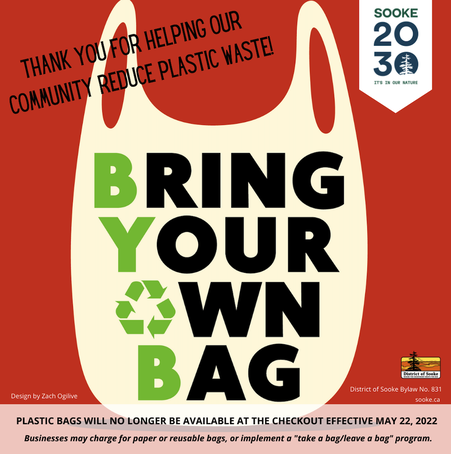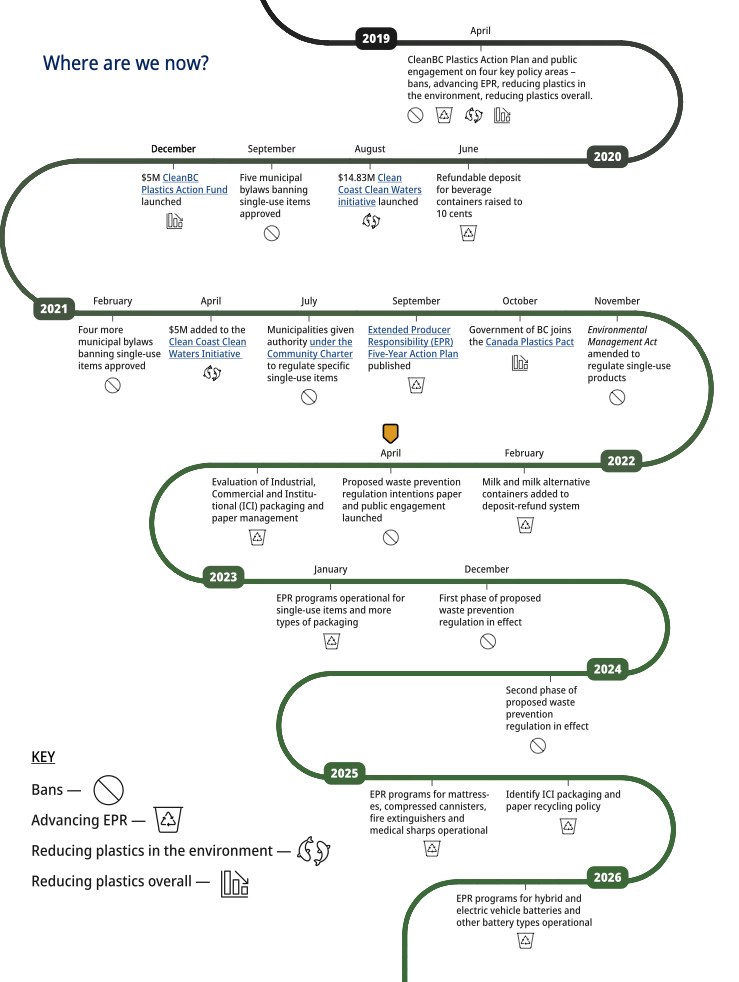Full details, including this handy PDF guide to the bylaw, are available from the District of Sooke. We're the 15th local government (of 163) in BC to adopt such a regulation (with 23 more underway with or contemplating action according to a recent update from the Retail Council of Canada.)
Many locals, of course, have made BYOB (bring your own bag) a habit for years now. Some of us (me, for instance), carry a cache of bags in our car trucks and do a fairly good yet admittedly inconsistent job of remembering to bring them with us to the check-out counter. (My Carolyn carries several collapsable roll-up bags in her purse, so we're covered when she's with me.)
Effective two Sundays from now, takeaway plastic bags will be gone from Sooke retailers (exceptions being the small bags used for loose grocery and hardware bulk items, wrap for meat and fish, or plastic used for prepared foods and baked goods that aren't pre-packaged.)
If you've not BYOB, you'll have to pay .25 per paper bag or a $2 maximum fee for any takeaway canvas bags the retailer may offer. Whether this is too minor a penalty to truly change consumer habits is debatable (some say a $2 hit is required), but Sooke is now in step with other early adopter Canadian and global communities that recognize this is a relatively easy way to make a significant environmental impact.
"It's the right thing to do," said Village Foods manager Wayne Kneeshaw and Western's Buzz Miriam when Sooke's two grocery stores decided to independently ban single-use plastic bags on Jan. 1, 2020. That policy had to end with COVID's hugely unfortunate advent, yet their leadership and the earlier support for Zero Waste Sooke's BYOB campaign from Western, Village, Home Hardware and Pharamasave speaks volumes about the environmental commitment of our business community.
Yes, not having them handy for household garbage will necessitate some inconvenience, the purchase of kitchen-catcher refills or, best, the adoption of zero-waste home strategies. (True, there are some arguments that bag bans are problematic.)
All this has been a long time coming for Sooke, as the timeline below reveals. Municipal governments across Canada have had, by necessity, to be leaders in banning single-use bags since the town of Leaf Rapids, Manitoba was the first In North America (just ahead of San Francisco) to do so in 2007. Before the complications described below ensued in 2019, Sooke was among the latest wave of BC communities pushing for plastic restrictions along with (on the south island) Victoria and Esquimalt.
In recent years, the federal and provincial governments have been developing ways to restrict and eliminate single-use plastics, in particular checkout bags, cutlery, foodservice ware, ring carriers, stir sticks and straws. Ottawa is working on a set of Zero Plastic Waste strategies with a particular focus on Canada's commitments to the Ocean Plastics Charter.
Provincially, the CleanBC Plastics Action Plan has been evolving since 2017; a new public engagement phase (deadline: June 21) was launched last month as attention turns to a broad range of single-use items (see the CleanBC background paper; interestingly the bag-bylaw recommendations align closely to Sooke's bylaw, which in turn is based on a model CRD bag bylaw prepared in 2018).
Reminders about why it matters: Surfrider Foundation Vancouver Island figures that the average Canadian uses a remarkable 200-300 one-time plastic bags per year. (Ottawa claims Canadians burn through 15 billion plastic bags and 57 million straws annually.) There's no end, sadly, of gruesome images of marine life and birds choking on and entangled in plastic. Microplastics were discovered for the first time in the human bloodstream earlier this year.
National Geographic detailed the impacts of plastics generally and microplastics in particular in this article. One of the more striking points: "Every year, about 8 million tons of plastic waste escapes into the oceans from coastal nations. That’s the equivalent of setting five garbage bags full of trash on every foot of coastline around the world."
Canada, Europe and other wealthy countries are not global plastic-pollution offenders at the level of poorer regions of the world. But if privileged we with our already massive carbon footprints don't model best behaviours, then how can we expect it elsewhere? Plus, as more of us in #Sooke will hopefully soon discover, #BYOB can be a meaningful way to do more of our small but collectively powerful bit to protect our environment. (Top priority in the current OCP and in public feedback for the new one, incidentally.)
Timeline
Fall 2016: Zero Waste Sooke, a working group of Transition Sooke, began advocating with the District for a Sooke single-use plastic bag ban via a council delegation in September, 2016. A ban was one of three priorities that had arisen from Zero Waste’s Talk Trash community meeting that April (the others were a community waste recovery centre and public drinking water fountains to reduce plastic bottle use.)
Spring 2017: We (I was part of ZWS in those days) secured the support of the aforementioned Sooke retailers in having Bring Your Own Bag (BYOB) signs posted at or near their entrance ways. (Then-Sooke graphic designer Zach Ogilvie’s logo has been licensed for District use in the bylaw launch this month.)
2017/2018: Council first discussed restricting single-use plastic bags in November, 2017 following a second Zero Waste Sooke delegation. It directed staff (July, 2018) to draft a Sooke bylaw.
April 2019: Surfrider Foundation and Zero Waste Sooke council delegation in April, 2019 repeated the request; Esquimalt and the City of Victoria had implemented their own bylaws that January.
May 13, 2019: Sooke council unanimously approved first and second reading of Draft Checkout Bag Regulation Bylaw #734.
July 2019: All plastic bag bylaws in BC, established and proposed, were put on hold following a July 2019 BC Court of Appeal decision related to a legal action by the Canadian Plastic Industry Association to revoke the Victoria bylaw. The Province of BC was asked to sign off on all such bylaws rather than leave this authority to local governments. BC’s Ministry of Environment and Climate Change Strategy said it would review the Appeal Court decision
Jan. 1, 2020: Sooke’s Village Foods and Western Foods eliminate single-use plastic bags from their check-out counters until COVID safety measures require their return in the spring.
July, 2021: The Ministry of Environment announced that it had approved already-adopted municipal bylaws in Richmond, Victoria, Saanich, Tofino and Ucluelet. It also gave local governments in BC authority to create their own single-use plastic bylaws.
Nov. 22, 2021: Sooke council unanimously adopted Checkout Bag Regulation Bylaw #734. Staff were asked to develop educational and implementation materials over a six month period leading to the bylaw's introduction on May 22.
PS Example of a 'take a bag, leave a bag' program that retailers might offer as indicated in the poster below. The flow chart is from pg. 3 of CleanBC's recently published Preventing Single-Use Plastic Waste in British Columbia intentions paper. Provincial actions, municipal bylaws and manufacturer responsibility for developing a circular economy of repair/reuse/repurpose is the plan.


 RSS Feed
RSS Feed